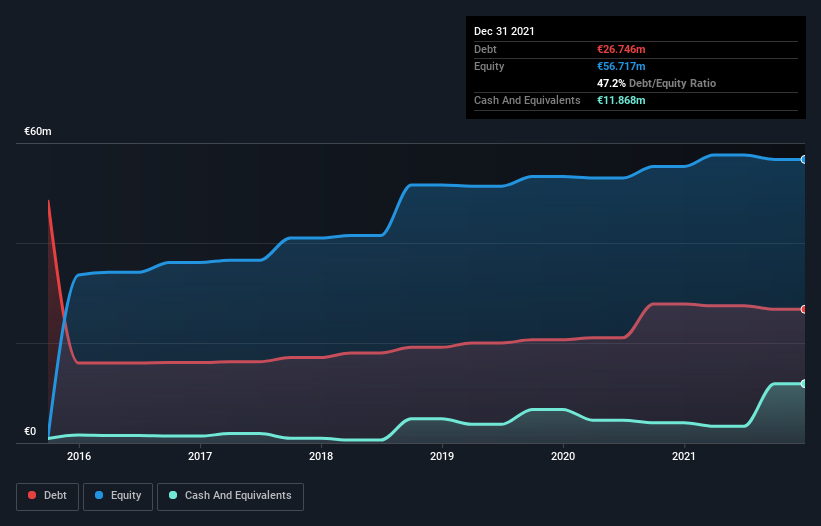Howard Marks put it nicely when he said that, rather than worrying about share price volatility, 'The possibility of permanent loss is the risk I worry about... and every practical investor I know worries about.' It's only natural to consider a company's balance sheet when you examine how risky it is, since debt is often involved when a business collapses. We can see that Malta Properties Company p.l.c. (MTSE:MPC) does use debt in its business. But the real question is whether this debt is making the company risky.
When Is Debt A Problem?
Debt assists a business until the business has trouble paying it off, either with new capital or with free cash flow. Part and parcel of capitalism is the process of 'creative destruction' where failed businesses are mercilessly liquidated by their bankers. However, a more usual (but still expensive) situation is where a company must dilute shareholders at a cheap share price simply to get debt under control. Of course, debt can be an important tool in businesses, particularly capital heavy businesses. The first step when considering a company's debt levels is to consider its cash and debt together.
See our latest analysis for Malta Properties
What Is Malta Properties's Net Debt?
The chart below, which you can click on for greater detail, shows that Malta Properties had €26.7m in debt in December 2021; about the same as the year before. However, because it has a cash reserve of €11.9m, its net debt is less, at about €14.9m.

How Strong Is Malta Properties' Balance Sheet?
Zooming in on the latest balance sheet data, we can see that Malta Properties had liabilities of €7.23m due within 12 months and liabilities of €28.9m due beyond that. Offsetting these obligations, it had cash of €11.9m as well as receivables valued at €1.13m due within 12 months. So its liabilities outweigh the sum of its cash and (near-term) receivables by €23.1m.
Malta Properties has a market capitalization of €56.2m, so it could very likely raise cash to ameliorate its balance sheet, if the need arose. But we definitely want to keep our eyes open to indications that its debt is bringing too much risk.
In order to size up a company's debt relative to its earnings, we calculate its net debt divided by its earnings before interest, tax, depreciation, and amortization (EBITDA) and its earnings before interest and tax (EBIT) divided by its interest expense (its interest cover). Thus we consider debt relative to earnings both with and without depreciation and amortization expenses.
With a net debt to EBITDA ratio of 6.9, it's fair to say Malta Properties does have a significant amount of debt. But the good news is that it boasts fairly comforting interest cover of 3.6 times, suggesting it can responsibly service its obligations. More concerning, Malta Properties saw its EBIT drop by 2.5% in the last twelve months. If it keeps going like that paying off its debt will be like running on a treadmill -- a lot of effort for not much advancement. There's no doubt that we learn most about debt from the balance sheet. But you can't view debt in total isolation; since Malta Properties will need earnings to service that debt. So if you're keen to discover more about its earnings, it might be worth checking out this graph of its long term earnings trend.
But our final consideration is also important, because a company cannot pay debt with paper profits; it needs cold hard cash. So we always check how much of that EBIT is translated into free cash flow. Looking at the most recent three years, Malta Properties recorded free cash flow of 24% of its EBIT, which is weaker than we'd expect. That's not great, when it comes to paying down debt.
Our View
Mulling over Malta Properties's attempt at managing its debt, based on its EBITDA,, we're certainly not enthusiastic. But at least its level of total liabilities is not so bad. Looking at the balance sheet and taking into account all these factors, we do believe that debt is making Malta Properties stock a bit risky. Some people like that sort of risk, but we're mindful of the potential pitfalls, so we'd probably prefer it carry less debt. There's no doubt that we learn most about debt from the balance sheet. But ultimately, every company can contain risks that exist outside of the balance sheet. Be aware that Malta Properties is showing 4 warning signs in our investment analysis , and 1 of those is a bit unpleasant...
If you're interested in investing in businesses that can grow profits without the burden of debt, then check out this free list of growing businesses that have net cash on the balance sheet.
New: Manage All Your Stock Portfolios in One Place
We've created the ultimate portfolio companion for stock investors, and it's free.
• Connect an unlimited number of Portfolios and see your total in one currency
• Be alerted to new Warning Signs or Risks via email or mobile
• Track the Fair Value of your stocks
Have feedback on this article? Concerned about the content? Get in touch with us directly. Alternatively, email editorial-team (at) simplywallst.com.
This article by Simply Wall St is general in nature. We provide commentary based on historical data and analyst forecasts only using an unbiased methodology and our articles are not intended to be financial advice. It does not constitute a recommendation to buy or sell any stock, and does not take account of your objectives, or your financial situation. We aim to bring you long-term focused analysis driven by fundamental data. Note that our analysis may not factor in the latest price-sensitive company announcements or qualitative material. Simply Wall St has no position in any stocks mentioned.
About MTSE:MPC
Malta Properties
Engages in the investment and development of commercial properties in Malta.
Medium-low risk unattractive dividend payer.
Market Insights
Community Narratives



